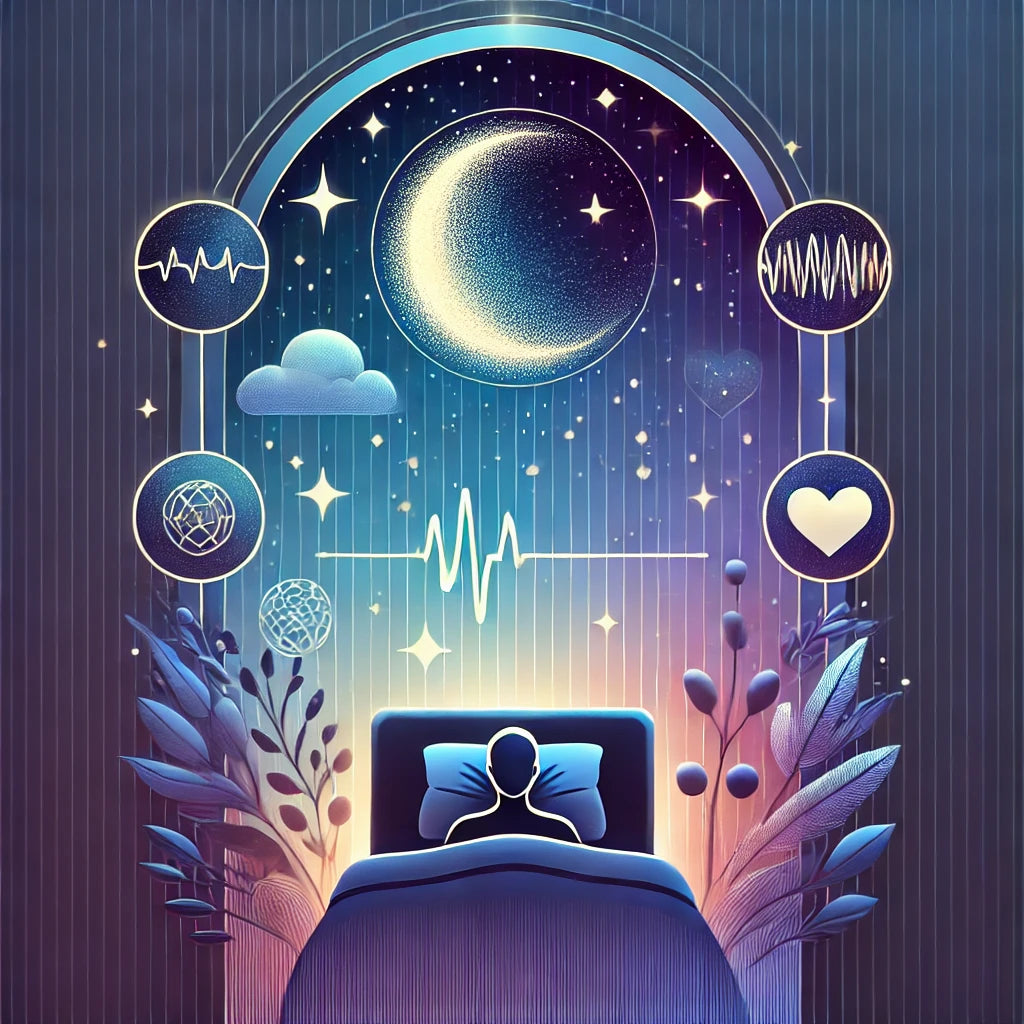
The Stages of Sleep and Why They Matter for Health
Share
Sleep is a cornerstone of good health, yet many of us underestimate its complexity and importance. Understanding the stages of sleep can offer valuable insights into how sleep influences your physical and mental well-being. Here, we’ll explore the different stages of sleep, why they matter, and how you can optimize your rest.
The Sleep Cycle: A Quick Overview
A complete sleep cycle typically lasts about 90 minutes and repeats several times throughout the night. Each cycle comprises four distinct stages, divided into two categories: non-rapid eye movement (NREM) sleep and rapid eye movement (REM) sleep.
Stage 1: Light Sleep (NREM)
-
Duration: 1-5 minutes
-
Key Features: This is the transitional stage between wakefulness and sleep. Your body begins to relax, and brain activity slows down.
-
Importance: Light sleep prepares your body to enter deeper stages of rest. It’s easy to be awakened during this stage.
Stage 2: Deeper Relaxation (NREM)
-
Duration: 10-25 minutes
-
Key Features: Body temperature drops, heart rate slows, and eye movement stops. Brain waves slow down, interspersed with bursts of rapid activity called sleep spindles.
-
Importance: This stage consolidates memories and regulates energy for the next day.
Stage 3: Deep Sleep (NREM)
-
Duration: 20-40 minutes
-
Key Features: This is the deepest phase of NREM sleep, also known as slow-wave sleep. Breathing, heart rate, and brain activity reach their lowest levels.
-
Importance: Deep sleep is critical for physical recovery, immune system strengthening, and tissue repair. It also plays a role in cognitive functions like learning and memory.
Stage 4: REM Sleep
-
Duration: 10-60 minutes (increases with each cycle)
-
Key Features: Brain activity becomes more active, resembling wakefulness. Dreams occur during this stage, and eyes move rapidly under closed eyelids.
-
Importance: REM sleep is essential for emotional regulation, creativity, and memory consolidation. It’s during this stage that your brain processes and stores information gathered during the day.
Why Each Stage Matters for Health
-
Physical Recovery:
-
Deep sleep (Stage 3) is crucial for muscle repair and growth, as well as cell regeneration. Without sufficient deep sleep, your body’s ability to heal diminishes.
-
-
Mental Clarity and Cognitive Function:
-
REM sleep is vital for memory and problem-solving. Skipping this stage can lead to difficulties in learning and concentration.
-
-
Emotional Well-Being:
-
REM sleep helps process emotions and reduce stress. Insufficient REM sleep can increase the risk of anxiety and depression.
-
-
Energy Regulation:
-
Sleep spindles in Stage 2 stabilize your energy levels for the following day, ensuring you wake up feeling refreshed.
-
-
Immune Health:
-
The immune system strengthens during deep sleep, making it easier for your body to fight off infections and illnesses.
-
Tips for Optimizing Your Sleep Cycles
-
Maintain a Consistent Sleep Schedule:
-
Go to bed and wake up at the same time every day, even on weekends. Consistency supports your body’s natural circadian rhythm.
-
-
Create a Relaxing Bedtime Routine:
-
Engage in calming activities like reading, meditating, or taking a warm bath before bed.
-
-
Limit Screen Time:
-
Avoid electronic devices at least an hour before bedtime. Blue light can disrupt melatonin production, making it harder to fall asleep.
-
-
Optimize Your Sleep Environment:
-
Keep your bedroom dark, cool, and quiet. Invest in a comfortable mattress and pillows.
-
-
Monitor Your Diet:
-
Avoid heavy meals, caffeine, and alcohol close to bedtime. Instead, opt for sleep-promoting snacks like almonds or herbal tea.
-
-
Consider Sleep Supplements:
-
Natural sleep aids like melatonin, magnesium, or products with ingredients tailored to support sleep cycles can be beneficial.
-
The Bottom Line
Each stage of sleep plays a unique role in maintaining your health and well-being. By understanding and prioritizing quality sleep, you can enhance your physical recovery, mental clarity, emotional balance, and overall quality of life. Start taking steps today to improve your sleep habits and reap the benefits of a well-rested body and mind.
